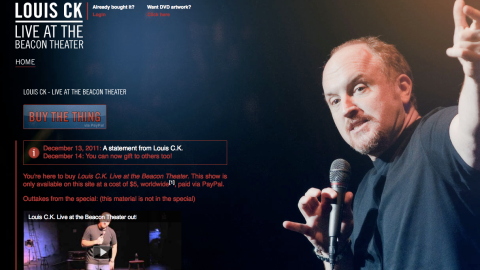For Louis CK, the Future of Content is No Laughing Matter

Judging by the tremendous outpouring of support he’s received across the Web over the past week, comedian Louis C.K. may be the future of how stars create, produce and distribute their content on the Internet. In mid-December, Louis C.K. bypassed the cable TV networks and made his one-hour live performance at the Beacon Theater available on his personal website at a flat rate of five bucks per video download. Thus far, the experiment in content distribution has been a wild success, netting Louis C.K. close to $750,000 after more than 200,000 downloads. Yes, people actually paid for content in 2011, even when they had opportunity to get it for free.
What made the experiment so audacious was not the pricing (nearly free), or the lack of digital rights management on the video content, or the payment mechanism (PayPal), it was the fact that Louis C.K. went out and managed everything – from the production of the live comedy show to the editing of the footage to the setting up of the website for downloads on his own dime, using readily-available, off-the-shelf tools. Even when people had the chance to access pirated versions of the show for free, Louis C.K. still got more than 200,000 downloads. After backing out $250,000 in production costs, the show still netted him a cool $750,00. Not bad for a few hours’ worth of work.
At a time when the marginal cost of original content has been driven down to nearly zero, Louis C.K.’s experiment is a reminder: Steward Brand’s oft-repeated maxim from 1984 that “information wants to be free” was followed by another, lesser-known maxim, “And it also wants to be expensive.”
And it’s not just Louis C.K. who’s found a way to monetize original content using personal, DIY distribution tools on the Web. The Wall Street Journal recently profiled Darcie Chan, a 37-year-old environmental lawyer with kids who found time to write after putting the kids to bed, and ended up writing a bestseller that’s sold 400,000+ copies, all without a publisher. Instead, she published the novel herself, took out ads to support the book herself, and priced the book at $0.99 to encourage broad-based sampling. All told, the Wall Street Journal estimates that she’s cleared $130,000 on the book. Darcie Chan’s model was similar to Louis C.K.’s – the do-it-yourself model fueled by a little elbow grease and a basic understanding of how to reach lots of people very quickly on the Internet. Or, consider Mark Cuban, who just wrote a 30,000-word e-book on business and is now looking to sell it to his millions of friends and followers on the Internet, all at a low-low price of $2.99.
Which is not to say that the world of content creation has been forever turned on its head and that content creators will now be churning out huge, seven-figure paychecks (ok, ok, maybe just six-figure paychecks) from now on. Louis C.K. and Mark Cuban are outliers in the content creation business, to say the least. They come with a huge installed base and plenty of name recognition.
To think that everyone can emulate the success of a Louis C.K. or Mark Cuban is a bit like thinking that Radiohead offering its latest album at a “pay-what-you-want” price without a major label would upend the music industry back in 2007. (The last time I checked, most songs on iTunes are still selling for $0.99 or $1.29, not a “pay-what-you-want” price.) However, the future for original content creators on the Internet is looking much brighter than at any time in the past 12 months. If you create any type of content on the Interwebs, you have to be asking yourself right now: What’s my Louis C.K. strategy for 2012?





